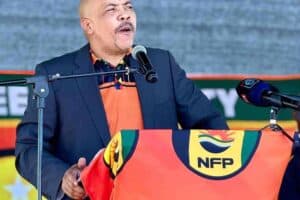The uMkhonto weSizwe (MK) party is merely a job scheme for the Zuma family and their associates, say political analysts

The unravelling of Jacob Zuma’s uMkhonto weSizwe (MK) party has begun and it could end up being one of the smallest parties in the country in future, experts say.
They said the party was moving towards being a Jacob Zuma family project and that would cause it to lose support in future.
The ongoing infighting within MK is also set to continue to tear the party apart as long as it fails to elect political structures and leadership to unite the party behind a common goal.
Nene hits back at former party
This follows the resignation of senior MK member Nhlanhla Nene from the party because MK is being run by Zuma’s daughter, Duduzile Zuma-Sambudla.
He also cited the party chopping and changing its public representatives and deviating from its path to achieve economic emancipation.
MK recently unceremoniously fired 18 MPs, allegedly for mismanagement. The members, whose party memberships were also terminated, were axed barely two months after being sworn in as parliamentarians.
“Today the MK is not wanted even by the EFF because it’s regarded as a Zuma family and siblings project,” said Nene.
“Over the course of seven months, MK has not managed to translate its overwhelming political power in Gauteng and KwaZulu-Natal into the attainment of economic freedom for our people.”
ALSO READ: MK party’s game of musical chairs shouldn’t be played by adults
He said the party was losing power because of chopping and changing members at national and provincial level, making it “even more difficult for MK to bring about economic emancipation” in South Africa.
“MK has proven to South Africa that it would rather be controlled by the president’s daughter than be professionally run by intellectuals and thinkers who can save the organisation,” Nene said.
Silke says party not growing
Political economy analyst Daniel Silk said MK would likely unravel further.
“What this does is make MK a smaller party, not in terms of its thinking but in terms of its public support. This party is going to be a project for the Zuma family.
“It will be seen by and large by the electorate as such and that will prevent MK from really growing beyond where it is at the moment,” Silke said.
The legitimacy of MK also remained in question because the party did not go through a democratic process, nor did it have a mechanism to define what it stood for, except trying to undermine President Cyril Ramaphosa and the broader ANC The party has become a job scheme for the Zuma family and their close associates, he added.
ALSO READ: ‘Ill treatment’ of MK party members creating instability
“We see that from the critics asking what does MK stand for? The success of MK [in the elections] offered the party and Jacob Zuma and the Zuma family an opportunity of capitalising on that success and finding jobs,” Silke said.
He cited jobs as MPs and the provincial legislatures for family, friends and political associates of the Zuma family and clan.
“Nothing angers members more than when family members get preference. So tendencies towards nepotism within MK and the hijacking of the party by the younger generation and family members are likely to anger those more mainstream MK MPs like Nene,” Silke said.
Party members from the vaguely centrist tradition would find it anathema to remain in the current environment within the party and might leave, he added.
Mashego describes change in party identity
Independent political analyst Goodenough Mashego said although Nene’s resignation did not spell the beginning of the end of MK, it symbolised the beginning of the party as it is now known.
“It is like a plane that is on the tarmac but never actually took off from the ground. Because MK was never launched, never adopted a constitution and never elected leadership.
“So it was just a guerrilla outfit that managed to get to the National Assembly and provincial legislatures, where it showed some strengths,” Mashego said.
“This is the beginning of the MK party we now know – a unified group who espouse values different to those of the ANC and aspire to take SA towards a better economic trajectory. That thinking that MK holds a promise is gone or dying and people will begin to see MK for what it is,” Mashego said.
He said MK’s official death would come later when the ANC elected stronger leadership in 2027, that would not favour a withdrawal from the government of national unity and would opt for a continued relationship with the DA.
Political analyst Thabang Motswaledi, from North-West University’s political studies and international relations department, said the lack of elected structures in MK was the main factor behind the infighting.
“There is probably a need for an established structure. It’s about collective leadership that is able to bring them together towards a common goal in a united party.”






